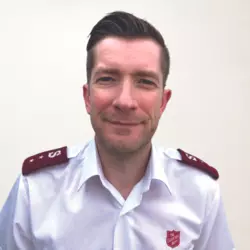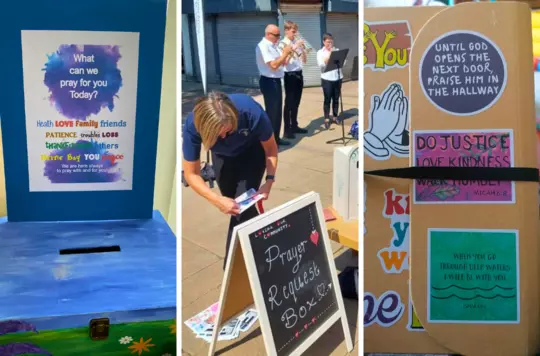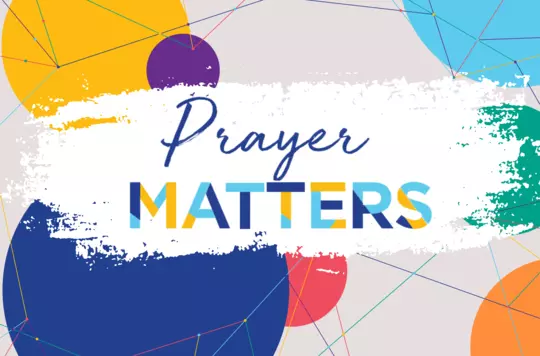25 January 2025
James 5: Hands together, eyes closed...
Captain Tim Swansbury
Captain Tim Swansbury presents practical prayer priorities.
Key text
Are you still unsure about what to do with that not-so-useful Christmas gift? If you like useful, then you’ll love the letter from James, which is such a practical, as well as challenging, book.
Praying in times of trouble (see v13) is obvious, isn’t it? It’s a natural response that even some who profess no faith find themselves doing without thinking. But James encourages us to pray whatever we’re experiencing. What about praying when we’re happy?
It’s widely recognised that singing releases dopamine and endorphins – brain chemicals that contribute to feelings of wellbeing – thus improving mental health. Does joy lead us to pray ‘songs of praise’ (v13)? Why not turn on one of our excellent national Christian radio stations or simply sing in the shower!
The next opportunity for prayer (see v14) is also obvious. Sickness certainly causes people to pray. How often do we call our leaders to pray for our healing, as described in this verse?
Pause and reflect
- Do you pray more instinctively in times of trouble or when things are good?
While James says to call leaders to pray for sickness, his fourth and final prayer situation requires everyone to be involved. Here is a scriptural command that is too readily ignored. The instruction is to ‘confess your sins to each other and pray for each other’ (v16). This is not confession to a religious leader, as some traditions practise, but a mutual and honest confessing and praying with trusted Christian friends.
These days, it does not have to happen face-to-face. I’m in a WhatsApp group with a few friends who are serious about being disciples of Jesus, where confession happens regularly. I can testify to the physical, emotional and spiritual healing that comes from confessing and praying together.
Pause and reflect
- How might confession work with your close Christian friends?
- Could you confess your sins to a friend and ask them to pray for you?
James also gives some pointers on the practicalities of prayer. Our prayers should be ‘in the name of the Lord’ (v14). Rather than speaking to the air, addressing the Lord directly is an important aspect of praying in his name. Prayers should be ‘offered in faith’ (v15). As we pray, let’s remember Jesus’ encouragement that faith as small as a mustard seed can move mountains (see Matthew 17:20).
I think James’s most impactful statement on prayer is: ‘The prayer of a righteous person is powerful and effective’ (v16). What an amazing promise and what a challenging responsibility!
Who, then, is righteous? Our righteousness ultimately comes from Christ, as Romans 3:22 confirms: ‘This righteousness is given through faith in Jesus Christ to all who believe.’ Paul also points to how we must play a part in that righteousness. We are to ‘put off your old self … and to put on the new self, created to be like God in true righteousness and holiness’ (Ephesians 4:22–24). The power and effectiveness of our prayer life, therefore, depends on how we live – on our personal holiness.
Can it still be said that The Salvation Army is a holiness movement? In the biography Samuel Logan Brengle: Portrait of a Prophet, Clarence W Hall includes a letter written by the Army’s holiness teacher to ‘my dear troubled comrade’. In it, Brengle states: ‘The great battles, the battles that decide our destiny and the destiny of generations yet unborn, are not fought on public platforms, but in the lonely hours of the night and in moments of agony.’
Pause and reflect
- How powerful and effective are our prayers?
- Does this correlate to our holiness?
By way of example, James refers to just-like-us Elijah, whose prayers were undoubtedly powerful and effective (see v17). Through prayer, Elijah saw God raise the dead (see 1 Kings 17:22), send fire (see 1 Kings 18:38) and stop rain for three and a half years (see 1 Kings 17:1).
By saying Elijah was just like us, James is trying to inspire his readers to pray mountain-moving prayers. The New Commitments pages are among my favourite in Salvationist. I particularly enjoy reading about the ‘front door’ ways by which people are being saved. It’s great to celebrate these ideas and initiatives, and important for us as an Army of salvation. What also interests me, however, is the unreported ‘back door’. Why and how do people leave our corps and even the Christian faith?
In the final verses of our study passage, James addresses the pressing need for us to be attentive to those who are in danger of wandering ‘from the truth’ (v19). James sees this as a life-and-death priority: ‘Whoever turns a sinner from the error of their way will save them from death and cover over a multitude of sins’ (v20).
The ‘whoever’ in verse 20 is not restricted to leaders. James calls upon all of us to be involved in bringing our brothers and sisters back to the truth. As much as we need to see people saved into our corps, we also need to save people from leaving. This is a vital skill to develop.
Pause and reflect
- Is there someone you need to bring back to the truth ‘with all wisdom’ (Colossians 3:16)?
- Have you been brought back to the Lord yourself?
May these practical words of James – and of God’s word as a whole – be a very useful gift to all of us.
Bible study by

Captain Tim Swansbury
Corps Officer, Rotherham
Discover more

Territorial Prayer Network Coordinator Major Gary Lacey talks about the first year of the UKI Boiler Room.

Lyn Woods explores how corps and centres across the territory are getting creative with prayer and seeing results.

This prayer initiative aims to provide a framework to help you move safely and confidently towards intergenerational prayer support.

